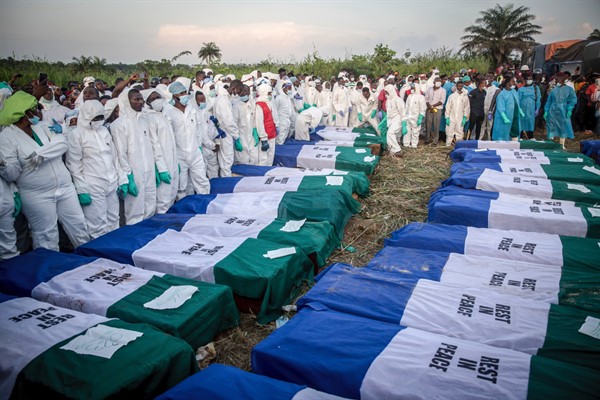More than 130 people have been reported killed after a fuel tanker hit a large truck and exploded Nov. 5 in Freetown, Sierra Leone’s capital. The tragedy occurred in the city’s densely populated Wellington district. The victims included motorbike drivers who reportedly rushed toward the scene to collect leaking fuel, which they presumably hoped to either use or sell, as well as roadside traders and commuters trapped in vehicles along the busy intersection. Many of the victims were burned beyond recognition, and posters of the dead and missing have been stuck on walls and buildings around the site of the accident and across Freetown. The city’s mayor, Yvonne Aki-Sawyerr, posted a condolence message on Twitter and has spent time visiting communities affected by the tragedy.
In a national address the following Sunday, President Julius Maada Bio—who cut short his trip to the COP26 summit in Glasgow—declared three days of mourning, pledging that surviving victims would be treated free of charge. He also attended a memorial held at the State House for the Wellington fire victims. The World Health Organization has delivered 6.6 metric tons of emergency supplies to support the medical response. Crowdfunding efforts led by Sierra Leoneans at home and the diaspora on behalf of victims and affected communities have commenced, with locals pledging to support one another in any way they can. Meanwhile, large numbers of people attended a mass burial Monday, where nearly 75 unidentifiable bodies were laid to rest in a cemetery that also holds victims of the 2014-2015 Ebola epidemic and a 2017 mudslide that killed more than 1,000 people, the country’s worst natural disaster.
Deadly explosions of fuel tankers are familiar occurrences across the continent, often in large, densely populated urban areas with inadequate physical and transport infrastructure to accommodate multiple heavy-duty vehicles or even manage the flow of vehicular traffic. Six months ago, a fuel tanker burned down half a village in Ghana’s Ashanti Region after skidding off the road in an accident. In July, 13 people were killed in western Kenya when a fuel tanker overturned, collided with other vehicles and caught fire. Last year, at least 25 people were killed in Kogi, Nigeria, when the driver of a fuel tanker lost control of the vehicle on a major highway. In August 2019, a tanker exploded in Morogoro, Tanzania, killing at least 60 people and injuring many others. And more than a decade ago, at least 230 people were killed in eastern Democratic Republic of Congo when a fuel tanker overturned and exploded.

